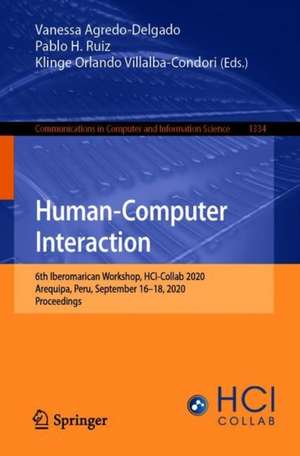Human-Computer Interaction: 6th Iberomarican Workshop, HCI-Collab 2020, Arequipa, Peru, September 16–18, 2020, Proceedings: Communications in Computer and Information Science, cartea 1334
Editat de Vanessa Agredo-Delgado, Pablo H. Ruiz, Klinge Orlando Villalba-Condorien Limba Engleză Paperback – 5 ian 2021
*The workshop was held virtually due to the COVID-19 pandemic.
Din seria Communications in Computer and Information Science
- 20%
 Preț: 325.48 lei
Preț: 325.48 lei - 20%
 Preț: 669.06 lei
Preț: 669.06 lei - 20%
 Preț: 324.64 lei
Preț: 324.64 lei - 20%
 Preț: 337.85 lei
Preț: 337.85 lei - 20%
 Preț: 656.19 lei
Preț: 656.19 lei - 20%
 Preț: 659.97 lei
Preț: 659.97 lei - 20%
 Preț: 333.88 lei
Preț: 333.88 lei - 20%
 Preț: 337.52 lei
Preț: 337.52 lei - 20%
 Preț: 656.36 lei
Preț: 656.36 lei - 20%
 Preț: 656.69 lei
Preț: 656.69 lei - 20%
 Preț: 659.31 lei
Preț: 659.31 lei -
 Preț: 392.60 lei
Preț: 392.60 lei - 20%
 Preț: 329.58 lei
Preț: 329.58 lei -
 Preț: 386.00 lei
Preț: 386.00 lei - 20%
 Preț: 336.02 lei
Preț: 336.02 lei - 20%
 Preț: 334.53 lei
Preț: 334.53 lei - 20%
 Preț: 331.74 lei
Preț: 331.74 lei - 20%
 Preț: 655.85 lei
Preț: 655.85 lei - 20%
 Preț: 338.49 lei
Preț: 338.49 lei - 20%
 Preț: 333.88 lei
Preț: 333.88 lei - 20%
 Preț: 334.53 lei
Preț: 334.53 lei - 20%
 Preț: 338.68 lei
Preț: 338.68 lei - 20%
 Preț: 666.58 lei
Preț: 666.58 lei - 20%
 Preț: 307.20 lei
Preț: 307.20 lei - 20%
 Preț: 336.02 lei
Preț: 336.02 lei - 20%
 Preț: 338.68 lei
Preț: 338.68 lei - 20%
 Preț: 330.24 lei
Preț: 330.24 lei - 20%
 Preț: 660.81 lei
Preț: 660.81 lei - 15%
 Preț: 648.42 lei
Preț: 648.42 lei - 20%
 Preț: 653.56 lei
Preț: 653.56 lei - 20%
 Preț: 332.06 lei
Preț: 332.06 lei - 20%
 Preț: 337.85 lei
Preț: 337.85 lei - 20%
 Preț: 1055.29 lei
Preț: 1055.29 lei - 20%
 Preț: 836.50 lei
Preț: 836.50 lei - 20%
 Preț: 656.69 lei
Preț: 656.69 lei - 20%
 Preț: 1231.01 lei
Preț: 1231.01 lei - 20%
 Preț: 331.25 lei
Preț: 331.25 lei - 20%
 Preț: 336.02 lei
Preț: 336.02 lei - 20%
 Preț: 323.00 lei
Preț: 323.00 lei - 20%
 Preț: 113.94 lei
Preț: 113.94 lei - 20%
 Preț: 336.21 lei
Preț: 336.21 lei -
 Preț: 387.75 lei
Preț: 387.75 lei - 20%
 Preț: 470.58 lei
Preț: 470.58 lei - 20%
 Preț: 750.86 lei
Preț: 750.86 lei - 20%
 Preț: 337.00 lei
Preț: 337.00 lei - 20%
 Preț: 327.95 lei
Preț: 327.95 lei - 20%
 Preț: 410.03 lei
Preț: 410.03 lei - 20%
 Preț: 335.36 lei
Preț: 335.36 lei - 20%
 Preț: 534.59 lei
Preț: 534.59 lei - 20%
 Preț: 673.02 lei
Preț: 673.02 lei
Preț: 334.20 lei
Preț vechi: 417.75 lei
-20% Nou
Puncte Express: 501
Preț estimativ în valută:
63.97€ • 66.53$ • 53.60£
63.97€ • 66.53$ • 53.60£
Carte tipărită la comandă
Livrare economică 13-27 martie
Preluare comenzi: 021 569.72.76
Specificații
ISBN-13: 9783030669188
ISBN-10: 3030669181
Pagini: 316
Ilustrații: XIV, 316 p. 128 illus., 110 illus. in color.
Dimensiuni: 155 x 235 mm
Greutate: 0.47 kg
Ediția:1st ed. 2020
Editura: Springer International Publishing
Colecția Springer
Seria Communications in Computer and Information Science
Locul publicării:Cham, Switzerland
ISBN-10: 3030669181
Pagini: 316
Ilustrații: XIV, 316 p. 128 illus., 110 illus. in color.
Dimensiuni: 155 x 235 mm
Greutate: 0.47 kg
Ediția:1st ed. 2020
Editura: Springer International Publishing
Colecția Springer
Seria Communications in Computer and Information Science
Locul publicării:Cham, Switzerland
Cuprins
A Physiotherapist’s Matter: Validating a Physical Rehabilitation Exergame to Enable Safe Evaluation with Patients.- An Architectural Model for Virtual Learning Environments Using Multicultural Learning Objects.- An experimental activity to develop usability and UX heuristics.- Autonomous Driving: Obtaining direction commands by classifying images within a simulation platform.- Breaking the Gap: Collaborative Environment as a Meeting Point to Provide and Receive Help to Overcome the Digital Gap.- Challenges in Integrating SCRUM and the User-Centered Design Framework: A Systematic Review.- Clustering Analysis of Usability in Web Sites of Higher Technological Institutes of Ecuador.- Collaborative learning group formation based on personality traits: An empirical study in initial Programming courses.- Communication preferences of first-year university students from Mexico and Spain.- CovidEmoVis - An Interactive Visual Analytic Tool for Exploring Emotions from Twitter Data of Covid-19.- Cyber Exposed at Preparatory: Classmates and Teachers Using Social Networks and Life Satisfaction.- Design and implementation of a voice-based conversational agent for the continuous training and learning of pharmaceutical sales representatives.- Evaluating the Socioenactive Experience with a Tangible Tabletop Installation: A Case Study.- Habitar: A Collaborative Tool to Visualize, Distribute, Organize and Share Domestic Tasks Towards Reducing the Gender Gap in Household Labor.- Human Body AR: a mobile application for teaching anatomy for elementary students using augmented reality.- Mixed Reality Infotainment Simulator, Work in Progress.- Mobile application to improve reading habits using Virtual Reality.- Model for Pervasive Social Play Experiences.- Model-Driven Multidisciplinary Production of Virtual Reality Environments for elementary school with ADHD.- Recommendations and Challenges for Developing English Vocabulary Learning Games.- Reference framework for measuring the level of technological acceptance by the elderly: a virtual assistants case study.- Relaxing and Familiar, Guidelines to Develop Interactive Applications for Dementia Patients.- Rivit: A Digital Game to Cognitively Train and Entertain Heart Failure Patients.- Smartphones, Suitable Tool for Driver Behavior Recognition. A Systematic Review.- State of the art of business simulation games modeling supported by brain-computer interfaces.- Tales of Etrya: English Vocabulary Game.- Towards a process definition for the shared understanding construction in Computer-Supported Collaborative Work.- Towards to usability guidelines construction for the design of interactive mobile applications for learning mathematics.- Usability Evaluation over Multiplayer Games on Display Wall Systems.- Voluminis: Mobile application for learning mathematics in geometry with augmented reality and gamification.- Wireless Haptic Glove for Interpretation and Communication of Deafblind People.
